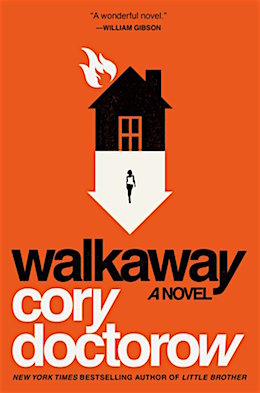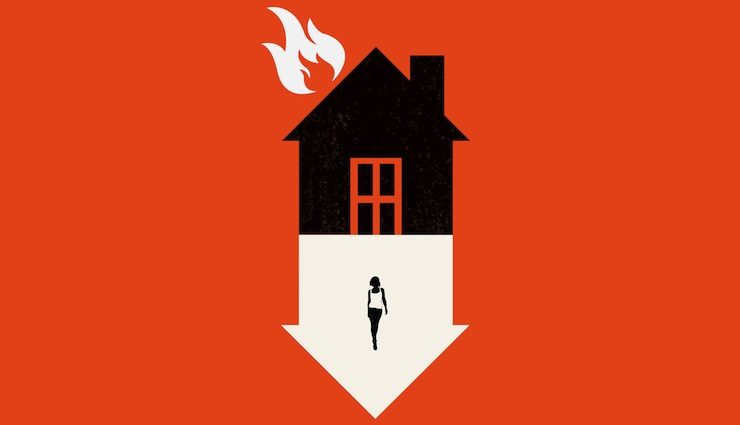Sci-fi is full of big ideas. WHAT IF ALIENS VISITED EARTH? WHAT IF WE’RE LIVING IN A SIMULATION? WHAT IF ROBOTS COULD TIME TRAVEL? With all the explosions and paradoxes in the way, it can be hard to notice the small ideas. Like, ahem, what if it was slightly easier to manufacture furniture?
Cory Doctorow’s upcoming novel Walkaway deals in small ideas. It takes dozens of incremental extensions to current technology and predicts their aggregate effect on the world. This more subtle, realistic approach to sci-fi can cover more ground than a single big idea. In the first chapter alone, Doctorow examines what a few years of continued cultural and technological advancement will do to transform manufacturing, politics, the economy, wealth disparity, diversity, privilege, partying, music, sex, beer, drugs, information security, tech bubbles, law, and law enforcement. It’s a lot to take in, but getting dumped in head-first—and it does require some thinking to follow along—is as refreshing as a dip in the Japanese baths that play such a prominent role in the novel.
This is a surprisingly rare approach to science fiction outside of certain literary pockets. Even mundane, realistic fiction can rely on one big idea instead of exploring small ones. Think of Black Mirror as the extreme case, taking a single technological advancement and extending it to one horrific conclusion: WHAT IF PEOPLE HAD A RATING SYSTEM AND EVERYTHING IN SOCIETY REVOLVED ENTIRELY AROUND IT? There are advantages to this approach. It ensures focus—a ready-made central conflict to hang characters, plot, and meaning upon. Big ideas can have a big impact in a short period of time (like the average span of a TV episode).
But big ideas take over. Like a loudmouth in a meeting, they prevent the quieter ideas from having their say. Small ideas, though, give each other room to breathe; they play off of each other, dance hand-in-hand, maybe swap some DNA and grow into little baby ideas that end up bigger—or not. A small idea can just exist, taking up its own space, surviving on its own modest merits. What if we could make beer out of piss?
The thing with small ideas is that, like the proverbial snowflakes in a storm, or Voltron, they combine to form something powerful. In Walkaway, Doctorow merges the small ideas of 3D-printing furniture, making beer out of piss, and many more tweaks to what is currently possible, causing them to add up to one doozy of a concept: the inevitable end of scarcity. We have chosen to create a world that capitalizes on and maintains a fight for limited resources. When resources are plentiful, that all falls apart, though whether it’s good or bad depends on who you are and how much you’re willing to change for a life of abundance.
 Early in the novel, one of the titular walkway habitats is introduced—a place where people can “walk away” from the default world of unevenly distributed scarcity. The compound is a very physical place, but it arises out of very digital concepts. Wikis and open-source collaboration help organize who does what, smart lighting highlights what chores need doing and where, and raw energy comes from the sun and the wind. It seems futuristic, until you realize that all of these things exist today. They’re not big ideas, relying on discovery of an unobtainium power source or an uninterrupted hockey stick graph of exponential advancement in computing power. There’s fiction here and there (especially in one key twist that takes an optimistic view of neuroscience), but most of it could start right now, if it’s the world we choose to create.
Early in the novel, one of the titular walkway habitats is introduced—a place where people can “walk away” from the default world of unevenly distributed scarcity. The compound is a very physical place, but it arises out of very digital concepts. Wikis and open-source collaboration help organize who does what, smart lighting highlights what chores need doing and where, and raw energy comes from the sun and the wind. It seems futuristic, until you realize that all of these things exist today. They’re not big ideas, relying on discovery of an unobtainium power source or an uninterrupted hockey stick graph of exponential advancement in computing power. There’s fiction here and there (especially in one key twist that takes an optimistic view of neuroscience), but most of it could start right now, if it’s the world we choose to create.
By not having any one idea jump too far from reality, Walkaway demonstrates how close we are, right now, to enormous promise and imminent peril. It can make the book read more like a manifesto than a novel in parts, but good sci-fi is always a bit uncomfortable, and it’s easier to swallow when packaged as this small-idea, understated approach. Utopia and dystopia are not mutually exclusive, as anyone sitting in 2017 watching for signs of nuclear war on their pocket supercomputer can relate to. The good news is that small ideas are easier to implement than big ones, so maybe, with their help, we can turn down the dystopia slider. Perhaps this is how utopia starts: not with a bang, but with a whimper.
P.T. Phronk’s latest novel, The Arborist, is quietly horrific science fiction about a man haunted by an unusual tree. Find P.T. on Twitter, his blog, or Forest City Pulp. He lives in London, Ontario (which was actually mentioned in Walkway—that’s not something you see every day), doing neuroscience for a startup, with his girlfriend and two hermit crabs, Death Crab and Cutie.










